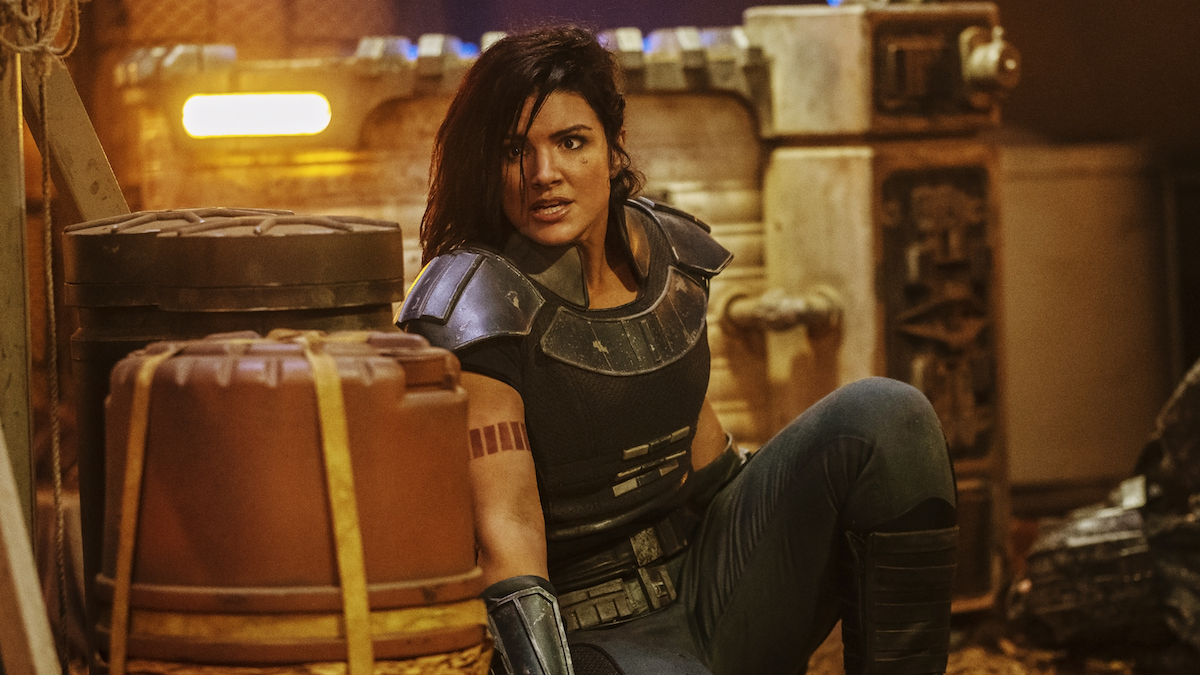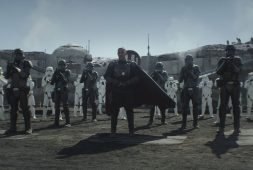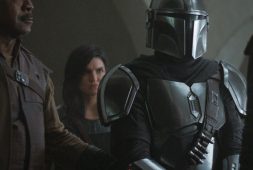
A Note to Parents: The Mandalorian is a series from the Star Wars universe, which means it’s mostly family friendly with scenes of violence. We at The Source For Parents never want to introduce something to kids that you wouldn’t want them to watch, so we develop discussions that parents can use if they feel the show is appropriate for their child. Our friends at Common Sense Media have given us some specifics on what to expect from this show.

Season 1 Episode 4 – Sanctuary
In the previous episode, the Mandalorian escaped from near death with the realization that his fellow Mandalorian would need to relocate their home to assure their future safety. The nomadic life of the Mandalorian we have followed during this series continues with an interesting twist in this fourth episode.
Looking to evade capture from the bounty hunters who pursue him, the Mandalorian lands on a planet called Sorgan.
Mandalorian (speaking to the child): Sorgan. Looks like there’s no star port, no industrial centers, no population density. Real backwater skug hole. Which means it’s perfect for us. You ready to lay low and stretch your legs for a couple of months, you little womp rat? Nobody’s gonna find us here.
The Mandalorian runs into a woman named Cara Dune who apparently is a former acquaintance of his. Because nothing can ever truly be easy, they are invited to rescue some villagers from raiders who have attacked and harassed them. Despite his initial declining of this invitation, the Mandalorian eventually accepts as he realizes he can hide out in their secluded village.
What happens is rather unexpected, and the Mandalorian seems to have found a home. He meets up with a widow named Omera, and they take an instant liking to each other. He resists her invitations to remove his helmet, but it’s clear that once again he is conflicted. He sees the child having a great time and fitting in, and he also likes where he is.
Omera also helps uncover what was previously unknown information about the Mandalorian.
Omera: Do you mind if ask you something?
Mandalorian: Go ahead.
Omera: How long has it been since you’ve taken that off?
Mandalorian: Yesterday.
Omera: I mean, in front of someone else.
Mandalorian: I wasn’t much older than they are.
Omera: You haven’t shown your face to anyone since you were a kid?
Mandalorian: No. I was happy that they took me in. My parents were killed and the Mandalorians took care of me.
Omera: I’m sorry.
Mandalorian: This is the Way.
We learn that he was not born into the Mandalorian, but has been with them since he was young. Perhaps this explains the conflict he feels in being in a village where he could choose to settle down and make his home.
After defeating the villagers’ enemies, the Mandalorian decides to leave the child behind. Omera invites him to stay and settle down with her, and he considers her offer.
Mandalorian: I think it’s clear he’s happy here.
Omera: What about you?
Mandalorian: Me?
Omera: Are you happy here? We want you to stay. The community’s grateful. You can pack all this away in case there’s ever trouble. You and your boy could have a good life. He could be a child for a while. Wouldn’t that be nice?
Mandalorian: It would – I don’t belong here.
He clearly thinks about it for a bit, as Omera starts to remove his helmet, but then the Mandalorian declares that he does not belong here. He continues in his conflict, but is looking beyond what’s in front of him. He knows he does not belong in this place, and is confident he has work to do elsewhere.
After it’s revealed that the bounty hunters have tracked the child, the Mandalorian takes him and prepares to head back into the unknown. Both the child and the Mandalorian are sad as they depart, but they are believing for a better ending to come.
For you and I, there are going to be troubles in this life, circumstances that we struggle to escape. There will be a temptation to look only at the moment, and to fixate on the present without lifting our gaze toward what is ahead. In the second book of Corinthians, the apostle Paul writes to the believers telling them to not always get hung up on what they see and what is temporary – but instead to lift their eyes toward eternity.
2 Corinthians 4:17-18
For our light and momentary troubles are achieving for us an eternal glory that far outweighs them all. So we fix our eyes not on what is seen, but on what is unseen, since what is seen is temporary, but what is unseen is eternal.
Sometimes we are going to have to look past the present to see that things are only one part of something bigger, something greater. Fixing your eyes on what’s unseen is – well almost impossible if you really think about it. However, what God is inviting us to do is to fixate on Him, the author of the future – and trust Him.
The Mandalorian fought the temptation to only see what was in front of him, and is going to be faithful to his mission – to protect the child. Despite the sadness of having to leave and the difficulty of what’s ahead, he knows his time on Sorgan was only one chapter of the story.
Let’s take some time and talk about what it means for you and I to have an eternal perspective in the most difficult times of our lives.
Discussion Questions (for parents and their children to engage in together)
- What were some things that stood out to you about this episode?
- Were there things in this episode that reminded you of previous Start Wars movies?
- Would you try the drink spotchka which they make from krill? (the bright blue fish)
- When do you think the Mandalorian first thinks about staying on Sorgan?
- Do you think he wanted to take his helmet off in front of Omera? Explain why you think the way you do.
- What does it say about the Mandalorian that he was willing to leave the child on Sorgan?
- Read 2 Corinthians 4:16-18. Why do you think Paul uses the words light and momentary to describe the troubles he’s writing about?
- What are some challenges we face when we try to get our eyes off the temporary troubles that we face?
- What do these verses say are the difference between what is seen and what is unseen?
- What are the benefits for us if we can live out these verses and see beyond what’s in front of us?
- What steps can we take to adapt this eternal perspective in our lives each day?
Rob Chagdes
Rob Chagdes is one of the pastors at Prairie Lakes Church in northern Iowa. In the years since he met Jesus as a sixteen year old, Rob has spent his life working to raise up the next generation to love God and invite others into His unending story. He spends most of his free time with his wife Leslie, their three amazing daughters, and their energetic dog Jedi. You can reach Rob at chagdeswrites@gmail.com



